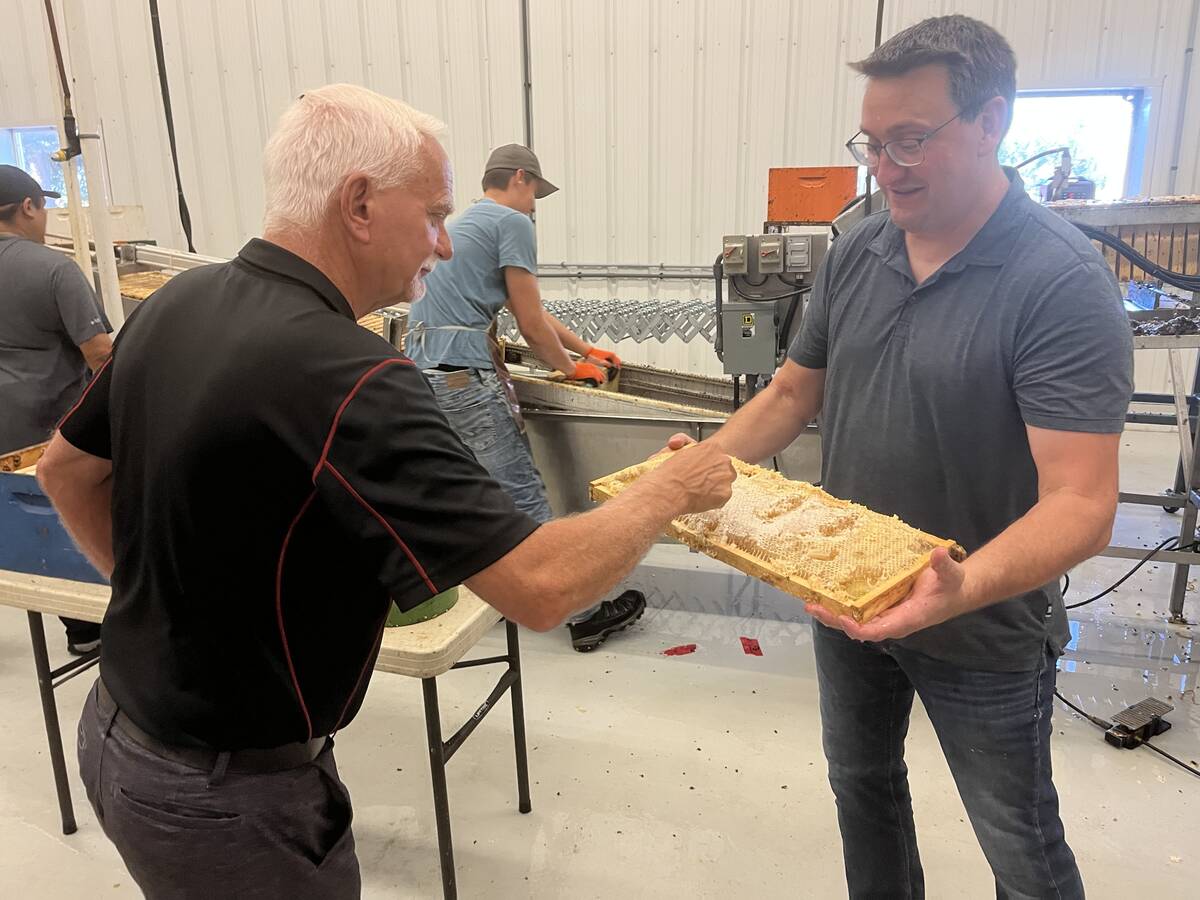Love for animals | Vern and Michelle Halpenny raise cattle and train horses in the shadow of Meadow Lake Provincial Park
DORINTOSH, Sask. — Lasagne is warming in the oven and wood smoke billows from the rooftop as the sun sets on Vern and Michelle Halpenny’s bungalow this brisk fall day.
The couple lives within sight of the Meadow Lake Provincial Park amidst forested habitat for abundant wildlife.
Neither one is interested in taking a vacation away from their property.
“We always say, ‘why would we?’ ” Michelle said of numerous opportunities to pursue their favoured hobbies of kayaking, hiking and horses.
Read Also

Alberta honey business ‘thrives’ despite bumpy beginnings
Thrive Honey showcases its honey production in market where Alberta produces 40 per cent of all honey produced in the country
“It’s just a nice place to live. We get to use all the seasons,” said Vern.
Outfitting companies, hunters and anglers abound here, but hunting doesn’t interest the Halpennys.
“I get more out of taking people to show the wildlife instead of shooting them,” Vern said about the tourists who flock to the region from around the world.
The couple, who raise 44 cow-calf pairs and train horses, commute to off-farm jobs in the district.
They calve out in spring, feeling it’s more in tune with nature and minimizes challenges from the weather.
They also call in experts when needed.
“We’re not scared to call the vet. They do it 10 times as fast,” said Michelle.
The Halpennys move the herd with electric fencing to prevent overgrazing and keep them away from the river and dugouts.
Their white heavy horses, Roy and Buford, help feed round bales to the cattle.
“We don’t have to listen to the tractor,” said Vern.
“I wouldn’t do any of this without (Michelle). She’s worked alongside me all this time.”
A mule and heavy and light horses greet them in a corral during a tour of their 600 acre country home.
“We love the animals,” said Michelle.
They also enjoy sharing their love of animals and the outdoors with others, inviting them on sleigh rides and cookouts, kayaking and trail rides.
The former school bus drivers used to host sleigh rides, candy cane hunts and cookouts for their students each December.
“We always tried to invite guests to experience things. Young people don’t get a chance to do stuff anymore,” said Vern, who added it’s important to pass on agricultural knowledge to the next generation.
“We get a lot out of having young people around. That’s why we keep them (the horses).… We’re fortunate there were older people in the business. If you grow up in that community, they can tell you what their experience is. That’s what we pass on to kids who come around us.”
Both grew up in the area: Michelle on a mixed farm and Vern as the son of the Dorintosh hotel owners.
Vern bought his first quarter section of land in high school and added more in later years.
Their son, 29 and newly married, now works in Alberta’s oil industry, but grew up here, managing horses, raising chickens, milking cows for the family’s cream quota and chopping wood.
“It was all bush when we came here,” said Michelle. “Anything here we had to haul here.”
Living so far north means planning for 200 days of feed for their animals. They protect it from foraging elk by keeping it behind a high fence.
“They would ruin the hay before we could get it fed out, so we built a fence around the stack yard to keep them off the feed,” said Vern.
“It’s not what they eat but what they waste. Elk like to crawl onto the top of the hay.”
The Halpennys had previously used donkeys to keep their stock safe from predators such as coyotes and bears, but harsh winters were a problem for the animals, which had to be housed in a shed during the colder months.
Now in their 50s, the couple no longer has donkeys and has downsized the cattle herd from 100 head.
The district has also changed significantly since their childhood.
Meadow Lake once had a dairy, eight grain elevators and a rail line but still operates an auction mart for cattle sales.
“Prices haven’t been where they should be,” said Vern, who added that today’s prices reflect 1992 values.
A training wheel in the yard attests to their work training horses, something they have less time for now that they work full time.
An assortment of jobs over the years has sustained their modest and treasured country lifestyle.
“You go to the job so I can have my life at home,” said Michelle.
Added Vern: “A lot want to do what we’re doing (in retirement) and we get to do it every day.”

















